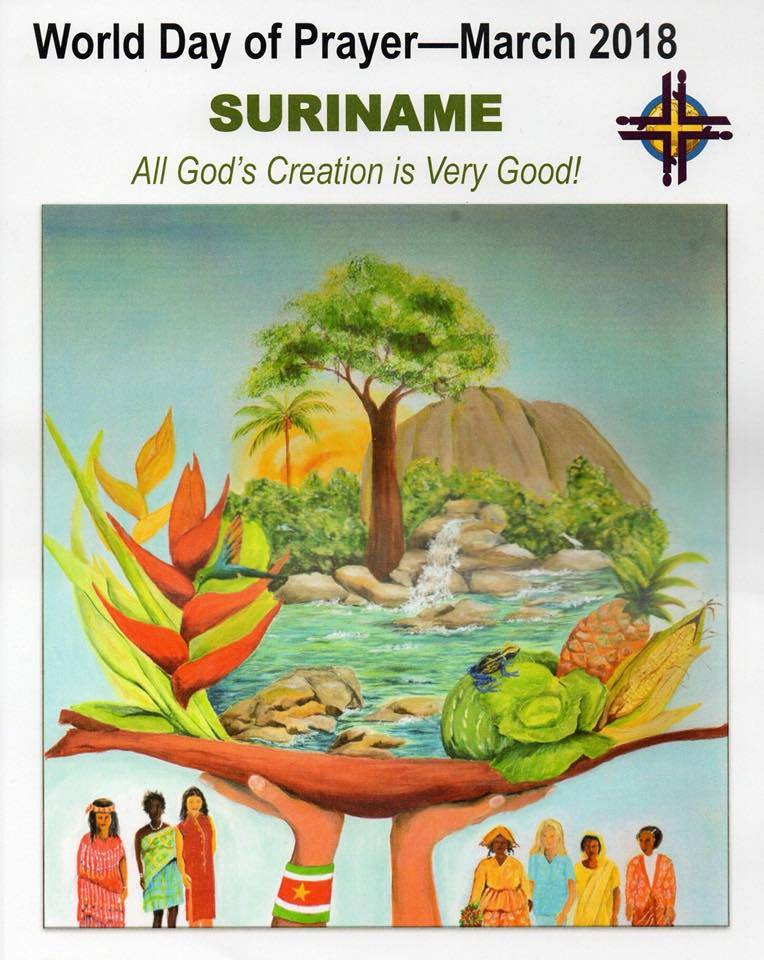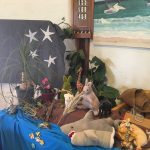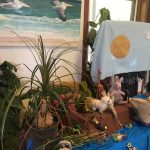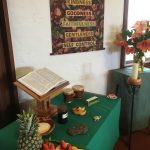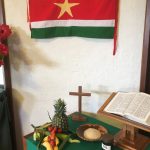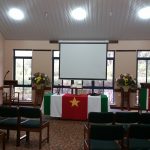The Uniting Churches in both Margaret River and Augusta hosted the World Day of Prayer service this year for the wider ecumenical community. The theme country was Suriname. The following is the address Rev Cathie Lambert gave to both services on the day. See below for photos from both services. Special thanks to the organising committee from each congregation for their work on preparing the service, and decorating the churches.
—
In Suriname, there are many folk tales from different cultures due to the diversity of people living there. One group of these originates in Africa and was brought by the slaves to Suriname. These are the Anansi tales. Anansi is a spider that often acts and appears as a man. He is synonymous with skill and wisdom of speech. Anansi is often celebrated as a symbol of slave resistance and survival. He is known for his trickery and cunning ways.
One story is “Anansi and the dispersal of wisdom”. It goes like this. Anansi was already very clever, but he decided to gather together all the wisdom he could find and keep it in a safe place. With all the wisdom sealed in a pot, he was still concerned that it was not safe enough, so he secretly took the pot to a tall thorny tree in the forest. His young son, Ntikuma, saw him go and followed him at some distance to see what he was doing.
The pot was too big for Anansi to hold while he climbed the tree, so he tied it in front of him. Like this the pot was in the way and Anansi kept slipping down, getting more and more frustrated and angry with each attempt.
Ntikuma laughed when he saw what Anansi was doing. “Why don’t you tie the pot behind you, then you will be able to grip the tree?” he suggested. Anansi was so annoyed by his failed attempts and the realisation that his child was right that he let the pot slip. It smashed and all the wisdom fell out. Just at this moment a storm arrived and the rain washed the wisdom into the stream. It was taken out to sea, and spread all around the world, so that there is now a little of it in everyone. Though Anansi chased his son home through the rain, he was reconciled to the loss, for, he says: “What is the use of all that wisdom if a young child still needs to put you right?”
There is much truth in this story about humanity. It seems in our nature to want to be right or to assume we hold all the knowledge. We are raised within a particular social framework and taught from a young age about “us” and “them”. We are taught to fear, to discriminate and to name as other. Anansi’s learning to listen to the child could very well be a lesson for us all.
Today, perhaps more than ever, we are a divided world; Christian and Muslim, male and female, black and white, liberal and progressive, gay and straight. Our dividing into factions or tribes gives us a sense of security and safety. We all do it. We join groups where we feel we belong. We live in areas where we feel comfortable. We look around for a church that fits us. We associate with people who speak the same language and behave the same way – the right way! This has been true throughout the centuries, but is more pronounced now in our more global world.
I cannot speak about what it is like to live in Suriname. However, from what I read, it is a place of many different cultures, religious groups and languages living relatively peacefully together. It is a land where a huge number of species of flora and fauna co-exist in a beautifully diverse ecosystem. Perhaps, in their choosing of today’s theme, “All God’s Creation is Very Good!”, the people of Suriname have a deeper understanding of what this really means.
The creation story we have heard today focuses at every point of creation on one statement from God, “And God said it was good.” Living in this stunning part of the world, I find it easy to look at the world around me and say “It is good”. In fact, this seems to be an understatement. We see the value and beauty of the world around us, and yet, we have not cared for it as good stewards.
But do we look at ourselves and our fellow human beings around us and say, “It is good”. Do we see ourselves as a beloved creation of God? Do we see the person sitting next to us as a beloved creation of God? But perhaps more importantly, do we see the person that we disagree with, the one who we consider wrong, the one who we fear, as a beloved creation of God? It’s easy to say “Yes, of course”, but the truth is in our actions.
Perhaps, Suriname, in bringing us this theme on a day of world wide prayer, is inviting us to a third way. As followers of Jesus, who himself took a third way, we are called into a kingdom not of “us” and “them”, or male and female, or Jews and Gentiles, but one where every person is known as a beloved creation of God. This is a place where we move beyond the dualistic thinking of the world and see in every person we meet, in every living thing, a creation for whom God has said “It is good”. We cannot do this alone. We can only come close to this hope by a deep understanding and connection to the one who created us. And this is why prayer is so important. This is way of being in the presence of God. We all do it differently. We all have different languages for how we speak about it. But prayer is the place where we hear God whisper, “You are my creation. You are good. You are my beloved”. And when we begin to truly believe that voice, we will believe it about others also.

